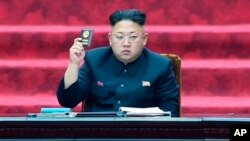North Korea remains a nation of mystery, intrigue and uncertainty to its regional neighbors and the rest of the world. Outsiders are beginning to get a small glimpse inside North Korea as it opens in a limited manner for tourists. Visitors, however, see only what they are allowed to view as the overall North Korean population is sequestered from outside contact.
Paul French, an independent East Asia analyst and author of North Korea, State of Paranoia, told VOA’s Jim Stevenson how apprehension on both sides of the border continues to limit what we know about the Hermit Kingdom.
FRENCH: Paranoia seems to be what largely drives the Kim dynasty. But I think it’s fair to say that we in the West, and also in China, and outside of North Korea are a little bit paranoid about them as well just because we don’t know what quite drives or motivates them.
STEVENSON: What are some of the myths we’re holding about North Korea at the current time?
FRENCH: Well, I think the biggest myth, or at least the most dangerous myth that I wanted to deal with in my book, as someone who has sort of visited North Korea on a number of occasions - which is not necessarily an easy thing to do, particularly for Americans of course – is to try and show the ordinary North Korean people and the daily life that they have as difficult and highly politicized and highly regimented and with a lot of surveillance, but that they are essentially normal people. I think that a lot of the North Korean government, we almost see like this robotic nation, the few images we get are always of military parades or something like that, but these are people who get up in the morning and kiss their kids goodbye and go off to work, and the kids go off to school, and so on.
STEVENSON: North Korea is opening up a little bit in terms of tourism, in terms of hard currency. What do tourists see as normal when they visit Pyongyang and other locations within North Korea?
FRENCH: It is a little bit like going to Disneyland in a sense, in that, you see exactly what the corporation that runs North Korea wants you to see and nothing else. And anyone that tries to sort of look behind the stage set, or actually talk to the ordinary people if you like, someone will try and stop you from doing that. So they very much want to handle you, they want to guide you around; they don’t want you to have ordinary conversations with people. So in that sense, there is an odd sort of feeling that you’re in one big sort of theme park when you’re there.
STEVENSON: What prevents the regime in North Korea from reforming while retaining power when it can clearly look over next door at China and see a 35 year blueprint for progress?
FRENCH: Well, this is becoming more and more of an issue, I think, now as more and more North Koreans, not just the elite, start to see just how wide the disparity has become between North and South Korea. This is way beyond anything we ever saw in – the example that’s always used, East and West Germany – the disparity of course being between Seoul and Pyongyang is almost unimaginable, they’re essentially now two completely different nations.
But again, their response to it has not been to emulate what has gone on in the South, or even to emulate what has gone on in China, which is a good example for them – a lot of market reforms, a lot of more money moving around the system, but [with] the authoritarian party staying in place, [or] regime survival, that they don’t seem to be able to do that. Their response has been to try and lock down and stop people knowing what’s going on outside.
STEVENSON: It brings us to the prospect for change or collapse and reunification. There is such a wide disparity between the North and the South, would that make reunification even remotely possible?
FRENCH: Everyone used to talk about it in an East and West Germany sort of way, that the South would have to take on the reunification of the country as the stronger economy, no one is even sure that anyone would even want to do that now. The current thinking, I think, really that is coming out of Seoul and certainly out of Beijing in terms of this, is that if there was any sudden collapse, economic collapse or sudden regime change or coup, the borders would have to be locked down. The DMZ would have to remain in place; there would have to be some sort of effort to bring North Korea up to a certain level before you could actually reopen the border there.













